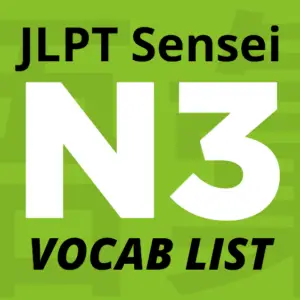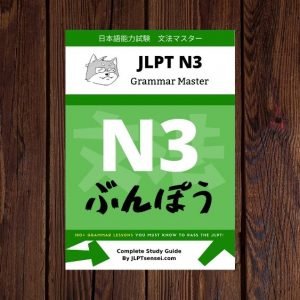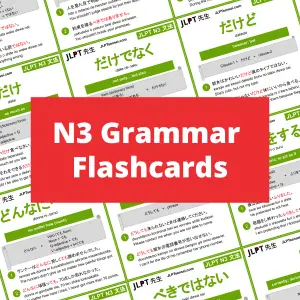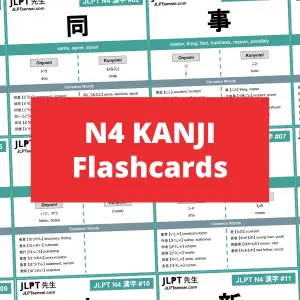
This is a list of the vocabulary that you need to know in order to pass the JLPT N3. In total, you will need to have a vocabulary of about 3,750 words.
This list includes lessons for the most common and important words for you to know, all listed in alphabetical order.
See our full study guide for how to pass the JLPT N3.
- See all JLPT N3 nouns
- Sell all JLPT N3 verbs
- Sell all JLPT N3 adverbs
- See all JLPT N3 adjectives
- See all JLPT N3 particles

| # | 語彙 | Vocabulary | Type | Meaning |
|---|---|---|---|---|
| 1 | 明かり | akari あかり | Noun | light; illumination; glow; gleam |
| 2 | 明ける | akeru あける | Verb, Ichidan verb, Transitive verb | to dawn,to become daylight |
| 3 | 明らか | akiraka あきらか | Adjective, な-adjective | clear; obvious |
| 4 | 悪魔 | akuma あくま | Noun | devil; demon; fiend; Satan |
| 5 | 暗記 | anki あんき | Noun, Verb, Suru verb | memorization; learning by heart |
| 6 | 新た | arata あらた | Noun, Adjective, な-adjective | new; fresh; novel |
| 7 | 有らゆる | arayuru あらゆる | Pre-noun adjectival | all; every |
| 8 | 集まり | atsumari あつまり | Noun | gathering; meeting; assembly; collection; attendance |
| 9 | 部分 | bubun ぶぶん | Noun | portion; section; part |
| 10 | 分 | bun ぶん | Noun, Suffix | part; segment; share; ration |
| 11 | 文明 | bunmei ぶんめい | Noun | civilization; culture |
| 12 | 分析 | bunseki ぶんせき | Noun, Verb, Suru verb | analysis |
| 13 | 分野 | bunya ぶんや | Noun | field; sphere; realm; division; branch |
| 14 | 父親 | chichioya ちちおや | Noun | father |
| 15 | 地平線 | chiheisen ちへいせん | Noun | horizon (related to land) |
| 16 | 地位 | chii ちい | Noun | (social) position; status |
| 17 | 長期 | chouki ちょうき | Noun | long-term |
| 18 | 中 | chuu ちゅう | Noun, Prefix, Suffix | during; while; medium; middle |
| 19 | 中学 | chuugaku ちゅうがく | Noun | junior high school; middle school |
| 20 | 昼食 | chuushoku ちゅうしょく | Noun | lunch; midday meal |
| 21 | 大部分 | daibubun だいぶぶん | Noun | most part; greater part; majority |
| 22 | 駄目 | dame だめ | Noun, Adjective, な-adjective | no good; cannot |
| 23 | 男子 | danshi だんし | Noun | youth; young man |
| 24 | 出会い | deai であい | Noun | meeting; rendezvous; encounter |
| 25 | 出会う | deau であう | Verb | to meet (by chance); to come across; to run across; to encounter |
| 26 | 読書 | dokusho どくしょ | Noun, Verb, Suru verb | reading |
| 27 | 努力 | doryoku どりょく | Noun, Verb, Suru verb | effort; exertion; endeavor; hard work; striving |
| 28 | 同一 | douitsu どういつ | Adjective, な-adjective | identical; same; one and the same; equal |
| 29 | 円 | en えん | Noun | yen; Japanese monetary unit; circle |
| 30 | 不利 | furi ふり | Noun, Adjective, な-adjective | disadvantage; handicap; unfavorable position |
| 31 | 不足 | fusoku ふそく | Noun, Adjective, な-adjective, Verb, Suru verb | insufficiency; shortage; deficiency; lack; dearth |
| 32 | 再び | futatabi ふたたび | Adverb | again; once more; a second time |
| 33 | 外交 | gaikou がいこう | Noun | diplomacy |
| 34 | 外出 | gaishutsu がいしゅつ | Noun, Verb, Suru verb | going out; outing; leaving (one's home, office, etc.) |
| 35 | 学期 | gakki がっき | Noun | school term; semester |
| 36 | 学 | gaku がく | Noun, Suffix | learning; education; study of |
| 37 | 学問 | gakumon がくもん | Noun, Verb, Suru verb | scholarship; study; learning |
| 38 | 学者 | gakusha がくしゃ | Noun | scholar |
| 39 | 学習 | gakushuu がくしゅう | Noun, Verb, Suru verb | study; learning; tutorial |
| 40 | 議長 | gichou ぎちょう | Noun | chairman; president; moderator |
| 41 | 議会 | gikai ぎかい | Noun | congress; parliament; diet; legislative assembly |
| 42 | 語学 | gogaku ごがく | Noun | study of foreign languages; linguistics |
| 43 | 激しい | hageshii はげしい | Adjective, い-adjective | violent; extreme; intense |
| 44 | 母親 | hahaoya ははおや | Noun | mother |
| 45 | 博物館 | hakubutsukan はくぶつかん | Noun | museum |
| 46 | 販売 | hanbai はんばい | Noun, Verb, Suru verb | sales; selling; marketing |
| 47 | 発明 | hatsumei はつめい | Noun, Adjective, な-adjective, Verb, Suru verb | invention |
| 48 | 外す | hazusu はずす | Verb, Godan verb, Transitive verb | to remove; to undo; to drop; to miss |
| 49 | 品 | hin ひん | Noun | elegance, article |
| 50 | 一言 | hitokoto ひとこと | Noun, Verb, Suru verb | single word; a few words; brief comment |
| 51 | 一人一人 | hitorihitori ひとりひとり | Noun, Suffix | one by one; each; one at a time |
| 52 | 本物 | honmono ほんもの | Noun | genuine article; real thing; real deal |
| 53 | 本人 | honnin ほんにん | Noun | the person in question; the person themselves; said person |
| 54 | 一致 | icchi いっち | Noun, Verb, Suru verb | agreement; union; match; coincidence |
| 55 | 一時 | ichiji いちじ | Noun | one o'clock |
| 56 | 意外 | igai いがい | Adjective, な-adjective, Adverb | unexpected; surprising |
| 57 | 一家 | ikka いっか | Noun | a family; a household; a home; one's family; whole family |
| 58 | 今に | imani いまに | Adverb | before long; even now |
| 59 | 今にも | imanimo いまにも | Adverb | at any moment; at any minute; on the verge of |
| 60 | 一般 | ippan いっぱん | Noun, Adjective, な-adjective | general; universal; ordinary; average; common |
| 61 | 一方 | ippou いっぽう | Noun | one (esp. of two); one way; the other direction; although |
| 62 | 一生 | isshou いっしょう | Noun | whole life; a lifetime; a generation |
| 63 | 一種 | isshu いっしゅ | Noun, Adverb | species; kind; variety |
| 64 | 一瞬 | isshun いっしゅん | Noun | instant; moment; for an instant |
| 65 | 一層 | issou いっそう | Noun, Adverb | much more; still more; all the more; single layer; sooner; preferably |
| 66 | 一体 | ittai いったい | Noun, Adverb | (what) the heck; (why) in the world |
| 67 | 所謂 | iwayuru いわゆる | Pre-noun adjectival | what is called; as it is called; the so-called; so to speak |
| 68 | 邪魔 | jama じゃま | Noun, Adjective, な-adjective, Suru verb | hindrance |
| 69 | 化学 | kagaku かがく | Noun | chemistry |
| 70 | 会 | kai かい | Noun, Suffix | meeting; assembly; party; association; club |
| 71 | 会員 | kai'in かいいん | Noun | member |
| 72 | 海外 | kaigai かいがい | Noun, Adjective | foreign; abroad; overseas |
| 73 | 会合 | kaigou かいごう | Noun, Verb, Suru verb | meeting; assembly; gathering; association |
| 74 | 会計 | kaikei かいけい | Noun | finance; account; treasurer; bill |
| 75 | 開始 | kaishi かいし | Noun, Verb, Suru verb | start; commencement; beginning; initiation |
| 76 | 科目 | kamoku かもく | Noun | (school) subject; curriculum; course |
| 77 | 権利 | kenri けんり | Noun | right; privilege |
| 78 | 基本 | kihon きほん | Noun | basics; fundamentals; basis; foundation |
| 79 | 記事 | kiji きじ | Noun | article; news story; report; account |
| 80 | 気味 | kimi きみ | Noun | sensation; feeling; tendency |
| 81 | 記念 | kinen きねん | Noun, Verb, Suru verb | commemoration; celebration; honoring the memory of something |
| 82 | 気に入る | kiniiru きにいる | Verb, Godan verb, Expression | to like; to take a liking to |
| 83 | 記入 | kinyuu きにゅう | Noun, Verb, Suru verb | entry; filling in; filling out |
| 84 | 記憶 | kioku きおく | Noun, Verb, Suru verb | memory; recollection; remembrance |
| 85 | 記者 | kisha きしゃ | Noun | reporter; journalist |
| 86 | 期待 | kitai きたい | Noun, Verb, Suru verb | expectation; anticipation; hope |
| 87 | 国家 | kokka こっか | Noun | state; country; nation |
| 88 | 国会 | kokkai こっかい | Noun | National Diet; legislative assembly of Japan; parliament; congress |
| 89 | 国境 | kokkyou こっきょう | Noun | national border |
| 90 | 国語 | kokugo こくご | Noun | national language |
| 91 | 国民 | kokumin こくみん | Noun | people (of a country); nation; citizen; national |
| 92 | 今後 | kongo こんご | Noun, Adverbial Noun | from now on; hereafter |
| 93 | 今回 | konkai こんかい | Noun, Adverbial Noun | now; this time; lately |
| 94 | 今日 | konnichi こんにち | Expression | today; this day |
| 95 | 転ぶ | korobu ころぶ | Verb, Godan verb, Intransitive verb | to fall down; to fall over |
| 96 | 高速 | kousoku こうそく | Noun, Adjective, な-adjective | high-speed; rapid; express |
| 97 | 訓練 | kunren くんれん | Noun, Verb, Suru verb | training; drill; practice; discipline |
| 98 | 教科書 | kyoukasho きょうかしょ | Noun | textbook; coursebook; schoolbook |
| 99 | 協力 | kyouryoku きょうりょく | Noun, Verb, Suru verb | cooperation; collaboration |
| 100 | 強力 | kyouryoku きょうりょく | Noun, Adjective, な-adjective | powerful; strong |
JLPT N3 vocab List total: (192)
Currently viewing page 1 of 2
JLPT N3 Study Guide
JLPT N3 Grammar Master [e-book]
Complete Study Guide
This e-book includes every grammar point you need to know in order to pass the JLPT N3, with detailed usage notes and numerous example sentences.
Pages: 378.
Grammar lessons: 182.
N3 Flashcards
*NOTE* Officially, there are no kanji, vocabulary, or grammar lists for the JLPT. As a result, it is not possible to be certain which kanji, words, or grammar will or will not appear in a given test. Our study lists are based on prior test data and comparisons with other available lists of JLPT kanji, vocabulary, grammar, etc.


